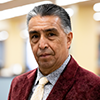
Mario Garcia, Ph.D., NSA, CAE, POC
Director of Institute of Cybersecurity / Professor — Computer Science
I love my life, my family, and my job. I exercise every day and I try to live a healthy life. I like to read, I like music including opera. I like to travel and I enjoy learning new things. I always try to have a positive attitude in life.
My administration style is people oriented: I am organized, efficient, and detail oriented. I do not hesitate to express my opinion but as a team player, I support actions once a decision is made. I get along well with people. I am a good listener who has an open door policy. I believe in shared governance: I value the opinion of others and I ask when I do not know something. I am not afraid of taking risks or making difficult decisions. I am aware of the many benefits that diversity brings.
My research is in Cybersecurity, Artificial Intelligence (AI) and Software Engineering. In Cybersecurity I do research in Computer Forensics, Network Security, and Web Security. Among my projects are the application of AI techniques such as Neural Networks, Fuzzy Logic, Genetic Algorithms, and Expert Systems to Intrusion detection - prevention. Another project is the implementation of applications to detect and prevent Web attacks based on the top 10 OWASP vulnerabilities. Examples of my research are: Using Pattern Filtering to Detect Cross-Site (XSS) Attacks; OWASP Vulnerabilities to Evaluate Open Source Web Scanners; Detecting Simulated Attacks in Computer Networks using resilient Propagation Artificial Neural Networks; A Simulation to Demonstrate the use of Synchronizer Token Pattern Approach to help prevent Cross Site Request Forgery (CSRF) Attacks; Design and Implementation of Heuristic based Phishing Detection System Using Address, Abnormal, Domain and HTML and JavaScript features; Detecting SQL Injections using String Matching Methods; Implementation of a Prototype to Secure Web Applications from SQL Injection and Cross Site Scripting Attacks Using an Intelligent Pattern Matching Approach; Analysis, Design and Implementation of a Methodology to Detect Clickjacking Attacks; A Simulation to Demonstrate the use of Synchronizer Token Pattern Approach to help prevent Cross Site Request Forgery (CSRF) Attacks;
Teaching Philosophy
I started teaching in higher education in 1980. Many years of experience have helped me mature and understand what it means to be an educator. My teaching philosophy is based on mutual respect: I respect students and I expect the same from them. I believe in active learning where students are actors and not only observers in class. To encourage students class participation, I use technology such as Canvas, Blackboard and WebCT. Most of my classes are hybrid with a face-to-face component and an online component. I give online quizzes of the new material before lectures so that students are ready for class discussion. Most of my courses also have a hands-on component or labs. Almost all students appreciate the hands-on component very much since they have a chance to apply the concepts covered in class.
Each week I include an online class discussion – students have to research one or two questions and answer them. In addition, students have to read other classmates posts and respond to them. This makes the class interactive in an environment where everybody learns including me. I start each lecture on time and finish on time. At the beginning of the class I give a review of the material covered the previous class, I answer questions about past lectures and then I present the list of new topics and objectives to be covered in class. At the end of the lecture I summarize the material learned or asked students to that.
During class I like to keep students active. Some of the methods I use are debates, case-based learning, working in groups, team projects, etc. I record my lectures using Canvas so that students can review the lecture at their convenience. I understand the class syllabus as a contract with the student, so I try to follow class content and respect dates for exams, projects, presentations, and homework.
Critical thinking and cultivation of curiosity and spirit of inquiry are fundamental in higher education. Learning how to learn should be one of the most important principles in higher education.